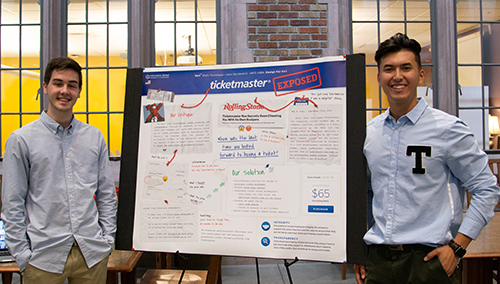
Students from Information School Assistant Professor Alexis Hiniker’s “Designing for Evil” have a lot of ideas for removing — or at least reducing — the evil in some popular apps and websites such as YouTube, Yelp and LinkedIn.
By learning how to design for evil, Informatics students in the INFO 498 class learn how to design for good. They shared their final projects in a poster session June 3 at Mary Gates Hall.
Hiniker’s class explores the responsibility of designers and developers to create systems that serve the greater good. Students examine things such as manipulative and addictive interfaces and create the evil, and not-so-evil, technologies of the future.
Sam Sturtevant and Sam Yoshikawa, both senior Informatics majors, took on Ticketmaster with their presentation. As customers know, the face value of a ticket is a far cry from the final price, which climbs dramatically once service charges are added. Yoshikawa pointed to a lack of transparency as the key “evil” on Ticketmaster’s website.
“The people we interviewed said they don’t know where that service fee is going, so they feel like they are being used,” he said.
Their solution was to show pricing upfront so that users see what they are buying, as well as some changes behind the scenes to try to decrease the role of scalpers and increase the share of the ticket price that goes to the artist.

Avani Amin, Stephanie Burd, Abby Huang and Christine Smet, all seniors in Informatics, looked at the Bank of America mobile app and found that it lacks clarity for users.
“People don’t understand their statement dates and how much is due, which makes it easy for users to have overdraft fees, and that specifically hurts vulnerable populations,” Burd said.
The group highlighted ways the bank could address these problems, by reducing clutter, clarifying language and making it less confusing to sign up for automatic payments.
Students suggested ethical improvements to products from several other companies, including Pokémon GO, RateMyProfessors.com and Starbucks.